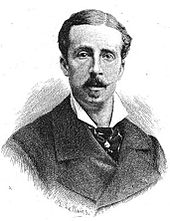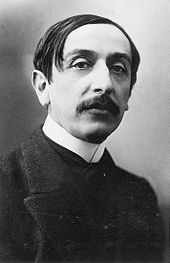Ligue des Patriotes
The Ligue des Patriotes ( Union of Patriots ) was founded on May 18, 1882 by the French writer Paul Déroulède and was a right-wing, nationalist, chauvinist, anti-parliamentary and anti-Semitic political association in France .
At the center of their political endeavors was the revenge for the defeat in the Franco-Prussian War of 1870/71 and the demand for the return of Alsace-Lorraine . What is necessary for this is inner unity and unity and the commitment of the individual for the fatherland up to the "heroic death" - the military and war were glorified. At its peak, the league had around 60,000 members (up to 200,000 according to its own information), most of them from the Paris area .
In 1889 Déroulède tried to persuade the military, namely General Georges Ernest Boulanger, to undertake a coup against the government, but Boulanger refused and committed suicide in 1891. In 1898, during the Dreyfus affair , Déroulède and his association were among the most radical agitators. On February 23, 1899, at the funeral of President Félix Faure with the "Putsch von Reuillu", he tried again to overthrow the parliamentary order by force. However, he failed and was sentenced to ten years in exile. The Ligue des Patriotes was temporarily dissolved. Action française then took over the leading role on the right wing of domestic politics .
Only during the First World War did the league regain its propaganda weight under the leadership of Maurice Barrès . A campaign was launched aimed at transforming the western Rhineland into a buffer state under French dominance or even open annexation .
After the World War, the movement, headed by Noël de Castelnau , moved closer to the monarchist Action française with the abandonment of republicanism . In 1924/25 there was a lot of activity at countless meetings in Paris, with a focus on anti-communism and anti-cartelism.
Individual evidence
- ↑ Peter Walkenhorst: Nation – Volk – Rasse. Radical nationalism in the German Empire 1890–1914. Verlag Vandenhoeck & Ruprecht, Göttingen 2007, ISBN 978-3-525-35157-4 , p. 327.
- ↑ François Beilecke: French intellectuals and the Third Republic. The example of an intellectual association 1892–1939 . Verlag Campus, Frankfurt am Main 2003, ISBN 3-593-37270-3 , 80f; and Jakob Vogel: Nations in step. The cult of the “Nation in Arms” in Germany and France, 1871–1914. Vandenhoeck & Ruprecht, Göttingen 1997, ISBN 3-525-35781-8 , p. 238; and Ernst Robert Curtius : Maurice Barrès and the spiritual foundations of French nationalism. Olms, Hildesheim 1962, pp. 125f.
- ^ David Stevenson: French war aims against Germany 1914-1919 . Oxford University Press, New York 1982, ISBN 0-19-822574-1 , p. 20.
- ↑ Andreas Wirsching: From World War to Civil War? Political extremism in Germany and France 1918-1933 / 39. Berlin and Paris in comparison . Verlag Oldenbourg, Munich 1999, ISBN 3-486-56357-2 , p. 278.
literature
- Peter M. Rutkoff: Revenge & revision. The ligue des patriotes and the origins of the radical right in France. 1882-1900 . Ohio University press, Athens 1981, ISBN 0-8214-0589-6 .
- Zeev Sternhell : Maurice Barrès et le nationalisme français . Complexe Verlag, Brussels 1985, ISBN 2-87027-164-6 .


